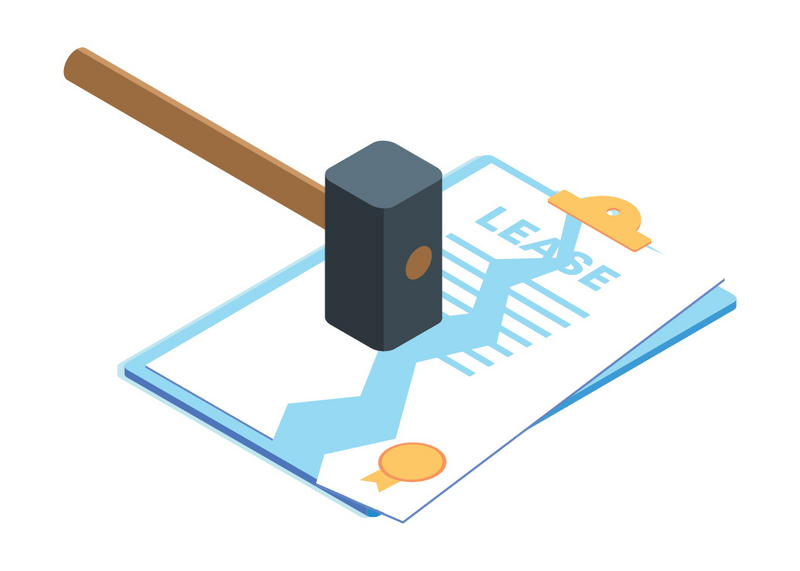- AppliancesElectriciansHVACLandscapingLocksmithPest ControlPlumbingRenovationRoofingT V RepairAll Home Improvement
- Car AccidentClass ActionCorporate LawCriminal DefenseDivorce LawEmployment LawFamily LawFinancial LawLegal AidMedical Injury LawyersMedical MalpracticeReal Estate LawWater Fire RestorationAll Legal
- InvestmentRetirementAll Finance
- Animal InsuranceAutoGeneral InsuranceHealth PolicyHome RentersAll Insurance
- DentalHealth SpecialistsAll Medical
- Animal CareVeterinaryAll Pets
- Auto GlassTowingAll Automotive
What to Know If You Want to Break Your Lease

Are you wondering how to break your lease early? Maybe you received an out-of-town job offer, or maybe you've decided to move in with your significant other. If you rent a home or apartment, it’s likely that you signed a lease, and most leases contain a beginning and ending date. As a tenant, you’re expected to remain living at the property and paying rent throughout the duration of the lease. For example, if you sign a 12-month lease, you’re legally obligated to remain living at this property for the entire 12-month period.
However, there are certain circumstances that may require you to break your lease before the end of the contract period. Before you make the decision to break your lease by moving out early, it’s important to understand exactly what that means.
If you're thinking about moving out before your lease ends, you might be wondering what happens if you break a lease. If you decide to terminate your lease early, you could face numerous consequences, including:
- Additional Costs: Depending on your specific situation and the terms of your lease, you may be charged additional fees, such as early termination fees, if you break your lease. In many cases, early termination fees can be as high as two months’ rent.
- Loss of security deposit: If you break your lease and don’t pay an early termination fee, the landlord has the right to keep all or a portion of your security deposit to cover the cost of rent payments until the lease ends or they find new tenants.
- Being sued in court: Your landlord can take you to court for breaking a lease and force you to pay rent until the end of the lease or until they can find new tenants.
- Difficulty finding a place to live: If word gets around that you broke your lease, you may have trouble leasing again.
How to Get Out of a Lease
There's a chance you may be able to get out of your lease legally. While each state and locality has its own regulations pertaining to landlord-tenant issues, there are some common issues that may allow you to get out of your lease early.
Servicemembers Civil Relief Act
The Servicemembers Civil Relief Act allows active-duty members of the United States Armed Forces to end their lease early if they’re being relocated. Under this act, you must provide the landlord with written notice as soon as possible and no later than 30 days prior to your move.
Landlord Harassment
If your landlord is harassing you, such as shutting off the utilities to your home, coming into your home unannounced or verbally abusing you, then you may be able to get out of your lease. Be sure to document all episodes of harassment to provide to the court if necessary.
Domestic Violence
If you’re a victim of domestic violence, you may also be able to get out of your lease. You may need to show your landlord a police report with the details of the abuse or a copy of your protection of abuse order.
Rental Is Unlivable
If the conditions of your rental apartment are deemed inhabitable and unsafe, you may be able to get out of your lease. Be sure to take plenty of pictures and obtain documents from official sources to prove your case in court.
More Related Articles:
- When Do You Need a Lawyer? Determine If You Need to Hire an Attorney
- What Is a Class-Action Lawsuit?
- What Is a Misdemeanor?
- What to Do After a Car Accident
- What Is Power of Attorney?
If you have an early termination clause in your lease, it’s important that you follow these instructions, including providing the landlord with a written notice and paying any early termination fees.
If your lease doesn't have an early termination clause, your first step should be to talk to your landlord, if possible. Explain your situation to the landlord and see if you can come to a mutual agreement. The landlord may want you to pay additional fees prior to moving out. Be sure to get any agreement in writing to protect yourself if the landlord takes you to court.
Another step you can take is to find a new renter for your apartment. This is commonly referred to as subletting and must be done with the approval of the landlord. Keep in mind that if the new tenant fails to pay rent or damages the property, the landlord could still hold you responsible. It’s important to have a sublease agreement in place to protect yourself.
When ending a lease, it’s always important to keep as much documentation as possible and to get everything in writing. Be sure to take plenty of pictures highlighting the condition of your rental before leaving.
Elocal Editorial Content is for educational and entertainment purposes only. The information provided on this site is not legal advice, and no attorney-client or confidential relationship is formed by use of the Editorial Content. We are not a law firm or a substitute for an attorney or law firm. We cannot provide advice, explanation, opinion, or recommendation about possible legal rights, remedies, defenses, options or strategies. The opinions, beliefs and viewpoints expressed by the eLocal Editorial Team and other third-party content providers do not necessarily reflect the opinions, beliefs and viewpoints of eLocal or its affiliate companies. Use of the Blog is subject to the
Website Terms and Conditions.The eLocal Editorial Team operates independently of eLocal USA's marketing and sales decisions.



